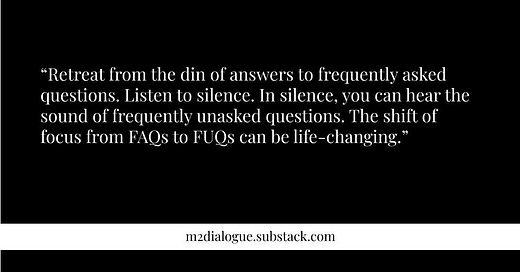A few weeks ago, I started playing a new game on Substack. Instead of publishing posts with answers to questions no one asked, I decided to publish only in response to questions and provocations from readers. Instead of writing answers to Frequently Unasked Questions (FUQs), I invited readers to submit their questions to Ask DaaS - Dialogue as a Service.
As of this writing, no one has responded to the invitation on Substack, even though I actively promoted the original post through Notes and in my latest posts on MISM. One subscriber, an IRL connection, asked a question via SMS, and I published a three-part response.
On the one hand, since I haven’t yet attracted my first hundred subscribers, it doesn’t surprise me that I haven’t received more questions. On the other hand, I’m surprised because my current subscribers and followers include IRL connections who typically ask questions and volunteer opinions when we speak IRL.
Through these conversations with my IRL subscribers, I have formed the impression that they’re not uninterested; they simply refuse to engage through Substack. So, the medium is the problem, so it seems.
One of these IRL connections even told me so explicitly. He was happy to speak by phone, and he showed great interest in what I’d been reading, but after hearing my proposal for how we could collaborate through Substack, he refused so categorically that I had to replay the proposal in my mind to make sure that I hadn’t inadvertently asked him to inject himself with the plague.
Another IRL connection became a paying subscriber and, in the course of our subsequent IRL interactions, he asked plenty of questions. He even spotted an error in one of my essays, for which I expressed my gratitude. But he only engaged in person. On Substack, he restricted himself to the use of the ‘like’ button.
At some point, I might share a hypothesis about this apparent resistance to Substack. In the meantime, the New Game must go on. I don't think the medium is the problem. I think it's the way.
In the next chapter of The New Game, in addition to responding to questions from readers, I will also use M2 Dialogue to publish my responses to FUQs. In this post, I'll start with my response to FUQ #1: “Why write about FUQs?”
Why write about FUQs?
Retreat from the din of answers to frequently asked questions. Listen to silence. In silence, you can hear the sound of frequently unasked questions. The shift of focus from FAQs to FUQs can be life-changing.
If you have trouble listening to silence, try listening to John Cage's musical masterpiece called 4’33”. It's conceivable that the experience will clear away any resistance to silence in four minutes and thirty-three seconds. You may choose to listen to this composition again and again — as many times as it takes you to realize that silence never repeats itself.
I write about FUQs because that's where the signal is. These are subjects worthy of question. For example:
Who am I?
What is happening?
What is Otium?
What is the Sabbath?
What is Ataraxy?
What is Passover?
What is Clean Text?
What is Profilicity?
What does Jewishness mean?
How are you responding to our descent into the Maelstrom?
What drove Aaron Bushnell to self-immolate?
What drove Max Azzarello to self-immolate?
What did Charles Pegue mean by “Everything begins in mysticism and ends in Politics”?
Why hasn't anyone developed a nutritional-information label for media diets?
What's behind the resistance to understanding media?
The supply of great FUQs never diminishes. So, ask not why write about FUQs. Ask why write about anything else?
To add your FUQ to the list, play the New Game.
The Latest from MISM
Money as Medicine: Pathways to Healing from the Ideology of 'Salve Lucrum'
Living in an Acoustic World: An Introduction by Marshall McLuhan
Responses to Xenosystems: A Gentle Introduction by Syd Steyerhart
Gratitude
Special thanks to
for the continued support of my work.




Humans cannot exist in absolute silence as some vibrations are necessary for our well-being, such as the Schumann resonance, which refers to the natural electromagnetic vibrations occurring in the Earth's atmosphere. These frequencies, typically around 7.83 Hz, are thought to influence human brain activity and overall health. Research suggests that exposure to these natural resonances helps to synchronize our biological rhythms, supporting functions like sleep, mood regulation, and cognitive processes. Without such ambient vibrations, humans might experience a sense of disorientation, stress, and adverse psychological effects, indicating that absolute silence is neither natural nor beneficial for our physiological and psychological equilibrium.